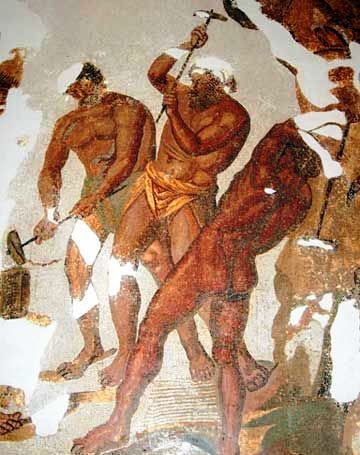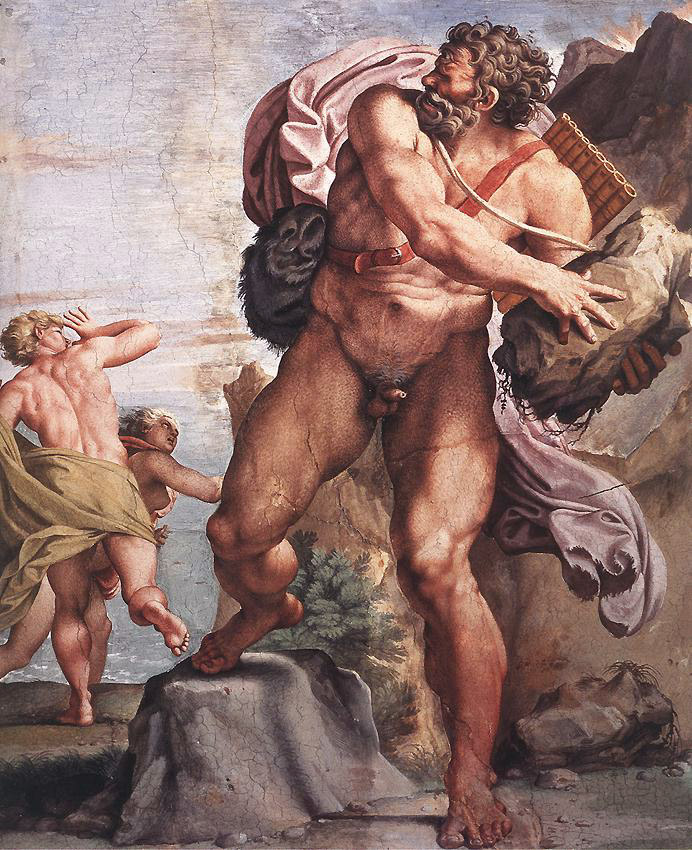Cyclopes
The One-Eyed Giants with Exceptional Strength, Low Intelligence, Savage Nature, and Antisocial Behavior

In Greek mythology, the Cyclopes were one-eyed giants known for their immense strength, low intelligence, wild nature, and antisocial behavior. One of the most famous Cyclopes was Polyphemus, who encountered Odysseus during his return journey after the Trojan War. In the "Theogony," the epic work of the poet Hesiod that describes the creation of the world, the Cyclopes were three immortal giants born from Uranus (Sky) and Gaia (Earth) during the early stages of the universe.
The goddess Gaia, or Earth, was one of the first beings to be created. This primordial deity gave birth to Uranus and other ancient elements, such as mountains and seas. Gaia then united with Uranus, and together they created the first generation of gods, which included the twelve Titans and the three Cyclopes. Following them were also three giants known as the Hecatoncheires. The Cyclopes took on the role of workers, while the Hecatoncheires served as warriors.
According to this version of the creation of the first beings, the Cyclopes were unique and existed even before the birth of Zeus and the twelve Olympian gods, whom they eventually served by taking the place of the original twelve Titans.
The three Cyclopes were named Arges, Steropes, and Brontes. They were primitive beings with immense strength who were imprisoned twice in Tartarus. First, their father Uranus imprisoned them out of fear that they would usurp his power.
When Cronus overthrew his father, he freed the Cyclopes to help him but later imprisoned them again.

When Zeus freed the Cyclopes from Tartarus, he took advantage of their ability to craft weapons that established him as the king of the gods. The Cyclopes became the makers of Zeus's thunderbolts and, according to the myth, also crafted the weapons of Zeus's two brothers: Poseidon's trident and Hades' helmet of invisibility. When the Olympian gods took power, the Cyclopes served under the supervision of Hephaestus in his workshop.
The Cyclopes were said to have been killed by Apollo. Apollo's son, Asclepius, the first doctor, used his skills to save many people from Hades. As punishment for defying the gods, Zeus killed Asclepius with a thunderbolt. Apollo then decided to take revenge on those who made the thunderbolts, the Cyclopes. As punishment, Zeus forced Apollo to serve for a year under Admetus.
In Homer's "Odyssey," the Cyclopes are not mentioned as three in number but as an entire people. However, they had the same characteristics described by Hesiod and were essentially a savage race of creatures. Their closest neighbors were the Phaeacians, who were peaceful, introverted, and civilized. Although the Cyclopes had a connection with the Phaeacians, the latter moved away to avoid the Cyclopes' aggressive behavior.

One specific Cyclops has become particularly well-known. In the "Odyssey," the travels of Odysseus are described as he returns after the end of the Trojan War, trying to get back to his kingdom in Ithaca. On one of these journeys, he finds himself in a fertile land full of vegetation, with many herds of animals and vineyards. This area is inhabited by the Cyclopes, giant shepherds who live in small, isolated groups, with their families residing in caves in the mountains. The Cyclopes have no social structure or agricultural activities but survive on the resources provided by nature.
Odysseus and his companions encounter a Cyclops named Polyphemus, the son of Poseidon. Polyphemus is tall and powerful and does not respect or heed the gods, such as Zeus. Odysseus and his men become trapped inside Polyphemus's cave when he seals the entrance with a huge boulder. Their stay there turns into a parody of the law of hospitality, as Polyphemus begins to eat his guests instead of offering them food. The "gift" of hospitality he offers Odysseus is to eat him last.
Like the Cyclops, Odysseus uses the code of hospitality as a weapon against the brainless Polyphemus. When the giant asks for his name, Odysseus replies that he is called "Nobody." Then, he offers the Cyclops wine (undiluted with water, unlike usual) to make him drunk. When Polyphemus falls asleep, Odysseus and his surviving companions strike him in his single eye with a sharp wooden stake they had prepared for this purpose.

The blinded Polyphemus called out for help from the other Cyclopes, claiming that "Nobody" had blinded him. However, the other Cyclopes ignored him, thinking he had gone mad. The next day, when Polyphemus moved the boulder blocking the exit from the cave, Odysseus and his companions hid under the rams of the herd that left, allowing them to escape from the Cyclops's hands. However, as Odysseus sailed away on his ship, he succumbed to human nature and shouted his real name from afar, boasting of his success over Polyphemus. Polyphemus then begged his father, Poseidon, to avenge him and cursed Odysseus to suffer greatly until his return home. This curse was the primary reason for the trials Odysseus faced on his journey back to Ithaca.
The term "Cyclopean" is used to describe the large protective walls that existed in the palaces of the Mycenaean period, such as those in Tiryns and Mycenae. These walls were constructed mainly from large polygonal and hexagonal boulders, which seemed so massive that they could not be moved by human strength. According to myth, these palaces were built by the Cyclopes in prehistoric times. Today, we still use the term to describe anything massive and gigantic.